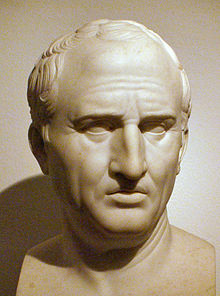Kísẹ́rò
Ìrísí
(Àtúnjúwe láti Márkù Túllíù Kísẹ́rò)
| Márkù Túllíù Kísẹ́rò Marcus Tullius Cicero | |
|---|---|
 Márkù Túllíù Kísẹ́rò | |
| Iṣẹ́ | Politician, lawyer, orator and philosopher |
| Ọmọ orílẹ̀-èdè | Ancient Roman |
| Subject | politics, law, philosophy, oratory |
| Literary movement | Golden Age Latin |
| Notable works | Politics: In Verrem, Catiline Orations, Philippics Philosophy: De Inventione |
 | |
| These articles cover Ancient Rome and the fall of the Republic | |
| Roman Republic, Mark Antony, Cleopatra VII, Assassination of Julius Caesar, Crassus, Pompey, Brutus, Cato the Younger, Theatre of Pompey, Cicero, First Triumvirate, Comitium |
| These articles cover the Ancient Roman Comitium of the Republican era | |
|---|---|
| Structures- | Rostra, Curia Hostilia, Curia Julia, Lapis Niger |
| Politicians- | Cicero, Gaius Gracchus, Julius Caesar |
| Assemblies- | Roman Senate, comitia curiata |
Márkù Túllíù Kísẹ́rò (pípè /ˈkɪsɨroʊ/; Látìnì Ògbólógbòó: /ˈkikeroː/; January 3, 106 BC – December 7, 43 BC; Marcus Tullius Cicero; sometimes anglicized as "Tully"), was a Roman philosopher, statesman, lawyer, political theorist, and Roman constitutionalist.

|
Àyọkà yìí tàbí apá rẹ̀ únfẹ́ àtúnṣe sí. Ẹ le fẹ̀ jù báyìí lọ tàbí kí ẹ ṣàtúnṣe rẹ̀ lọ́nà tí yíò mu kúnrẹ́rẹ́. Ẹ ran Wikipedia lọ́wọ́ láti fẹ̀ẹ́ jù báyìí lọ. |
